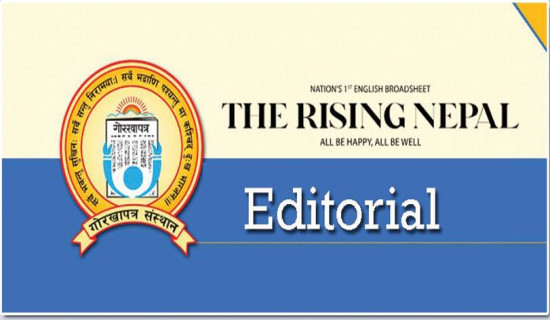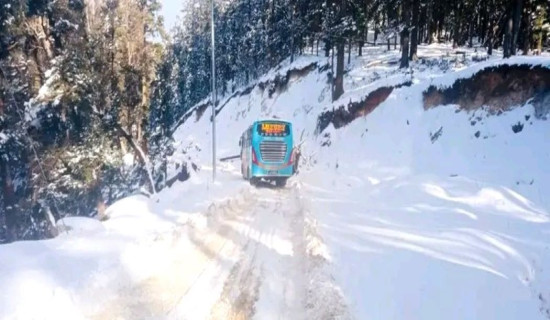- Tuesday, 27 January 2026
Cold Wave Threat In Tarai
Extreme weather phenomena are increasing due to the impact of global warming and climate change. And the recent spate of cold wave gripping the Tarai belt is one of these climate extremities affecting people, especially the vulnerable groups. Prolonged spell of dense fog that deprives the plains of the warm sun light has sent temperatures tumbling and lack of light and heat for the past few days has affected the normal life along the Tarai region, including Banke and Dhanusha districts. Children, senior citizens and people from impoverished communities like Musahar, Dom and Chamar are hardest hit by the ongoing wave of freezing cold. As a result, schools have been shut down, number of service seekers in government offices have fallen significantly and the movement of people during morning and evening hours too has gone down significantly.
Most of the flights to the Tarai based airports are getting canceled owing to poor visibility caused by foggy condition. This has increased high chance of the outbreak of cold-related illnesses such as pneumonia and influenza. In such a situation, it is advisable to keep warm and drink warm water. The districts across the Tarai region witness this phenomenon every year, with the poorest of the poor lacking adequate preparedness owing to their poverty and absence of awareness. The government should take this situation seriously and take proactive steps for the safety of the people concerned.
The people most affected by cold waves are the poor and daily wage earners who on the one hand lack preparations for the winter owing to their poverty and on the other hand when the cold wave hits, they lose jobs due to decreased human activities. This section of people lack both enough food and clothes to keep themselves warm during winter. They are reported to have been using jute sacks filled with straw to keep themselves warm. The cases of cold-related ailments like pneumonia are surging in the Tarai districts. Children, elderly and people with chronic diseases are most affected.
As per the information given by the field office of the Department of Hydrology and Meteorology at Ranjha, the temperature of Nepalgunj has been falling over the past few days. On Thursday and Friday, the temperatures dropped even further, and hovered around 7.7 to 9 degrees Celsius. The Chief District Officer and Coordinator of the District Disaster Management Committee of Banke says that the local level authorities have been mobilised to make necessary arrangements in their respective municipalities to protect the citizens from the cold, but the preparations still seem to be inadequate. Likewise, the Madhes government has planned to distribute 20,000 blankets to people affected by extreme cold. The government needs to be more sensitive about the pains and sufferings of the people, and if it has plans to distribute relief aid, that should be timely.
People in the Tarai, especially those from lower strata are in dire need of assistance, and the government should spring into urgent action instead of just collecting the data of the needy. Before this, there were reports of the people dying of cold in the quake-affected area of Jajarkot which calls for relief assistance without wasting time. The government needs to be more sensitive about the protection of the lives of people living at risk and distribute relief materials like warm clothes and blankets before it is too late. Medical manpower should also be made available to deal with cold-related illnesses.

















